What is a Garage-Ready Freezer? Features & Pros
Author: Rick Worst | Editor: Omar Alonso
Review & Research: Jen Worst & Chris Miller

Are you planning on installing a freezer in your garage? Do you live in a warm region of the United States? If so, you might consider buying a "garage-ready" freezer instead of a standard model. What's the difference between a garage-ready freezer and a regular freezer you have in the kitchen? Actually, what is a garage-ready freezer anyways?
Why Would You Need a Garage-Ready Freezer?
A garage-ready freezer is a purpose-built appliance for use in outdoor spaces or the garage. Your standard freezer doesn't have the insulation or thermostats to operate efficiently in an uninsulated environment where the temperature fluctuates between the summer and winter.
Standard models are used inside the home where the ambient temperature is stable and doesn't fluctuate much between the day and night or the seasons, usually between 60 ºF to 85ºF. However, placing a standard freezer model in the garage means it has to deal with temperatures ranging from blistering heat to freezing cold.
If the ambient temperature in the garage gets above the 100ºF mark during the summer, the freezer's compressor has to work harder to keep the interior cold. As a result, the compressor and thermostats experience higher levels of wear and tear, reducing the service life of these parts.
When ambient temperatures inside the garage dip below 38ºF in the winter, the freezer might not work at all because the thermostats assume the freezer is cold enough. As a result, the food in the freezer might start thawing. So can you keep a freezer in a garage in the summer? The right kind, you can.
What Is a Garage-Ready Freezer?
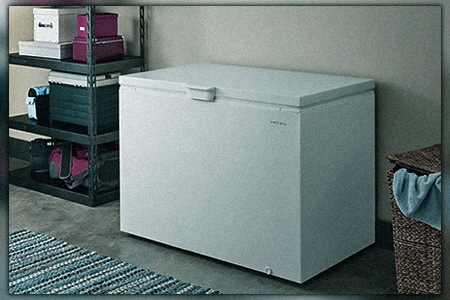
What does garage-ready freezer mean? A garage-ready freezer is a purpose-built appliance designed to deal with temperature fluctuations in the garage or outdoor areas. It's different from a standard freezer in several ways. What makes a freezer garage-ready?
Enhanced Thermostat Controls
When the thermostats in the freezer detect warm air, it activates the compressor to cool the freezer compartment and keep the food inside at a stable temperature setting. During the winter, the thermostats might not detect any warm air, meaning they don't activate the compressor.
When the temperature dips below 38ºF, the thermostat assumes the freezer's interior is cold enough and doesn't turn on. So, to trick the thermostat into efficient operation, a garage-ready model comes with a built-in heating element that blows warm air around the thermostat, tricking it into activating the compressor.
A garage-ready freezer shouldn't display any of the following issues when you test it.
- There should be no condensation on the interior panels of the freezer
- There should be no formation of ice on the freezer's interior panels
- The wiring should be correctly insulated against moisture
- The compressor must keep working when the temperatures dip below 38 °F
What is a garage-ready freezer? It's one that doesn't have the attributes listed above.
Built to Handle Temperature Fluctuations
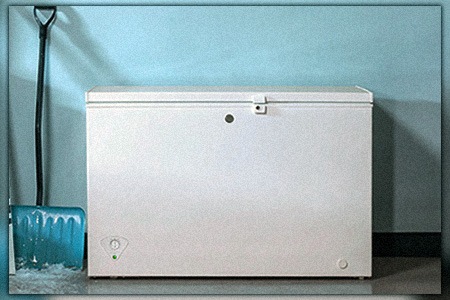
Some states see wild temperature fluctuations between seasons. The ambient temperatures inside your garage may get above 100ºF in the summer and below 38ºF in the winter. The freezer should have a durable compressor capable of working in these temperature conditions. Otherwise it'd be like having left your freezer door open.
A compressor in a standard freezer might not cope with the constant activation required to maintain stable temperatures in the freezer compartment. As a result of running for long intervals, the components in the device might burn out, reducing the service life of the freezer and the need for an expensive replacement or repair.
The compressor found in garage-ready freezers has an industrial design. This allows it to operate longer than a standard freezer without damaging the internal components. However, it's best to position the freezer away from direct light in the garage and to give it sufficient space around the sides and rear panel to allow optimal airflow around the unit.
Tougher Seal
Most standard freezer models come with a seal designed for use inside the home. However, the fluctuation of ambient temperatures in the garage may cause the seal to perish faster than in the kitchen. If the seal fails, the freezer has difficulty keeping the temperature inside the compartment stable.
As a result, it turns on the compressor more frequently. Constant compressor operation may cause an oil leak or premature wearing and burnout of the compressor components. Garage-ready Freezers come with thicker, durable seals to withstand aggressive temperature fluctuations in the garage and outdoor spaces.
Improved Insulation
The garage-ready freezer has thicker insulation on the side panels and the lid. The thicker insulation allows the unit to maintain a stable temperature in the freezer compartment, even with huge fluctuations in ambient temperatures in the garage.
One answer to what is a garage-ready freezer relates to the insulation. More insulation means the freezer compartment stays cold for longer. As a result, the thermostats don't have to activate the compressor as often, reducing wear and tear on the unit.
Set the Freezer Up on a Dedicated Circuit
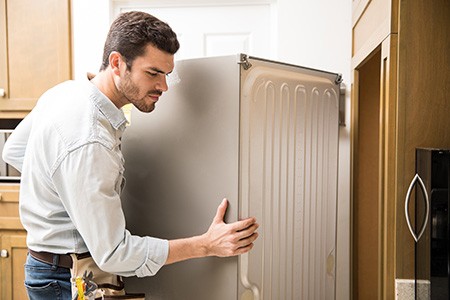
We recommend setting up your garage-ready freezer on a dedicated circuit in the garage. That means you give the freezer its own outlet. You can use the right gauge extension cord for a refrigerator, too, if needed.
These appliances draw a lot of power, and setting them up on a shared circuit may cause pressure on the system, causing inefficient operation. In some cases, the additional load on the circuit might cause the compressor to fail or result in an electrical fire. You need to be careful about using an extension cord with a refrigerator, too.
Installing your garage freezer on a dedicated circuit allows you to do the followingZ
- Install an independent circuit breaker for the outlet and the garage.
- Prevent arcing in the wiring and stop it from overheating.
- Prevent tripping of the main circuit breaker if there's a fault with the freezer.
You'll need adequate space in the garage to set up your freezer. Depending on the space available, you can choose between an upright or chest freezer to suit your requirements.
Chest freezers are the better option for better insulation and less electricity consumption. However, they require more space around the sides of the unit for optimal air circulation.
Garage-Ready Freezers vs. Outdoor Freezers
There's a slight difference between a "garage-ready" freezer and an "outdoor" freezer. The primary difference between the two is outdoor freezer models have approval from Underwriters Laboratories (UL) for use outdoors when exposed to wet weather conditions.
As a result, you can leave the freezer outdoors in the rain, and it won't damage the appliance. Garage-ready freezers aren't weatherproofed, so you can't use them in wet conditions. However, outdoor freezers are designed to work in moderate climates, not in freezing temperatures.
What is a Garage Kit for a Freezer?
As discussed earlier, the issue with standard freezer models is that they only have a single thermostat and sensor for detecting the ambient temperature around the unit. In the garage, the temperature might drop well below 38 °F, resulting in inefficient compressor operation and thawing of the freezer compartment.
A garage-ready freezer kit features a heating coil that wraps around the thermostat, tricking it into assuming the ambient temperature in the room is warmer than it really is. Brands like Whirlpool and Frigidaire sell these heating kits for standalone freezers. However, they aren't available for LG or Samsung models.
FAQ’s Concerning Garage-Ready Freezers
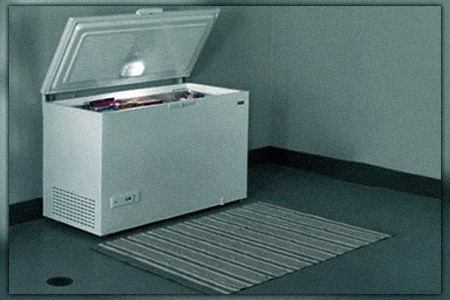
There’s a handful of questions that always arise regarding this topic of what is a garage-ready freezer, so let’s cover those now in case you have them as well.
Do Garage-Ready Freezers Require GFCI-Certified Outlets?
Garage-ready freezers come with GFCI certification. The Ground Fault Interrupter (GFI) and Ground Fault Circuit Interrupter (GFCI) ratings mean the same thing. These are special outlets in your bathroom and kitchen that trip when sensing sudden increases in electrical load.
The National Electrical Code (NEC) mandates all commercial kitchen outlets have GFCI protection in the United States. GFCI protection is required in residential homes for garage outlets to meet the building code, as per section 210.8A of the 2017 National Electrical Code, bullet #2.
Can I Put a Freezer in the Garage or Will it Fail?
Yes. You can put a standard freezer in the garage if you live in a moderate climate. However, if you live in a region with cold winters, the thermostat might not turn on the compressor when temperatures in the garage drop below 38ºF, causing the freezer compartment to thaw.
In warm temperatures above 100ºF, the freezer compressor must work harder to maintain cold temperatures in the freezer compartment. It'll take longer for a fridge to get cold, too. As a result of the excessive operation, the compressor might leak or burn out prematurely, reducing the freezer's service life and the need for a costly repair.
What Is a Garage-Ready Freezer?
A garage-ready freezer is a purpose-built model for use in the garage and outdoor spaces. This freezer has a durable seal, extra insulation, enhanced thermostats, and an industrial-grade compressor. As a result, it can handle wide temperature fluctuations between night and day and the summer and winter.
Can You Put a Garage-Ready Freezer in the House?
Sure. There's nothing stopping you from using a garage-ready freezer indoors. It will work more efficiently due to having to combat less extreme temperature ranges.
Key Takeaways Regarding Garage Ready Freezers
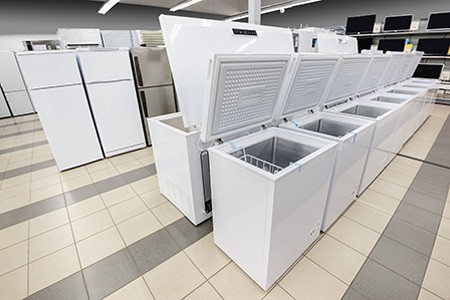
So, is it worth buying a garage-ready freezer? Here are the pros and cons to consider before making your purchase.
Garage-Ready Freezer Pros
- A garage-ready freezer frees up room in the kitchen and gives you extra food storage in the garage if you have a large family or you keep a significant amount of food storage on hand.
- Garage-ready freezers come with Energy Star ratings for efficient operation and defrosting functions for easy maintenance and use.
- Garage-ready freezers allow you to store food in your garage in climates with cold winters or exceptionally hot summers.
Garage-Ready Freezer Cons
- Garage-ready freezers cost significantly more than standard models.
- Some models use more electricity than standard freezers, especially in garages with extreme ambient temperatures to the upside or downside.
- Some garages might not have the space for a freezer.
If you're looking into one of these models, you already know you have the space and the budget, so those negatives are out of the equation, which means the benefits heavily outweigh not having one.
What is a Garage-Ready Refrigerator?
So what is a garage-ready freezer? It's a freezer designed to operate in higher and lower temperatures in your garage. It contains thermostats and insulation that make this all possible. It's a simple concept but a nice luxury to enjoy if you have the space and cash to make it happen.



